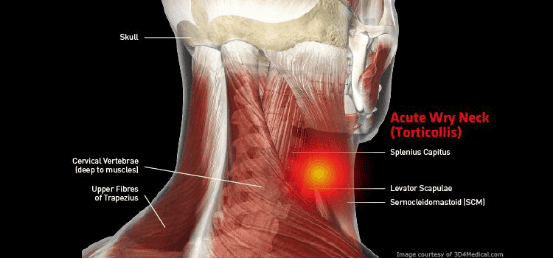A wry neck, also known as facet joint sprain, is the complaint of a painful and stiff neck that causes an inability or difficulty turning the neck in different directions. It is a common condition that can be quite limiting to sufferers. However the good news is that it can improve quickly with treatment!
Wry Neck
What is Wry Neck?
What causes it?
The most common way to develop a wry neck is to wake up in the morning with pain and stiffness after sleeping in a poor posture e.g. on your back with too many pillows, on your stomach with excessive neck twisting.
You may also have performed activities the day before that involved slouching, sustained, repetitive or prolonged poor posture/movements. This causes the structures in your neck to stretch over time and allows the joints in the back of the neck to stiffen up. A wry neck can also be caused by a simple sudden quick movement of the neck, e.g. waking up suddenly during the night from a noise. However symptoms are usually not felt until the next morning.
Symptoms
- Pain in the middle or side of the neck.
- A tightening (muscle spasm) and stiffness in the muscles of the neck.
- A tilting of your chin to one side or your neck being fixed in an abnormal position, usually rotated away from the side of the pain.
- Reduced neck movement, especially when turning your head to the side.
- Can lead to a headache.

Diagnosis
Your physiotherapist will perform a thorough subjective and objective physical examination to make the diagnosis of wry neck and exclude any other conditions. This usually involves the therapist asking you questions about how the pain came on, feeling, measuring and assessing the areas around your neck.
Treatment
Many people that experience this condition recover well within a few days. It is recommended you visit a physiotherapist early on to assist with quicker recovery. Some of the treatments include:
- Mobilisation/manipulation of the stiff joint(s)
- Soft tissue massage to help the neck muscles relax
- Traction
- Stretching exercises
- Range of motion exercises
- Dry needling
- Postural taping
- Education regarding posture, appropriate use of pillows and lumbar rolls
Tips and tricks for managing daily life
- Take your time when reaching for things, turning your head or laying down.
- Ensure you perform the stretches and exercises prescribed by your physiotherapist.
Prevention
- Having a comfortable pillow to sleep on at night.
How long till I get better
Most people start feeling much better within a few days. However, it may take up to one week for your neck movements and your range of movement to return to normal.
For all your acute neck pain needs, feel free to give us a call on 02 9793 8840 or Book Online

New Client Offer - 10% OFF
Are you in pain? Not sure if we can help you?
Book your initial appointment and receive 10% off any service!